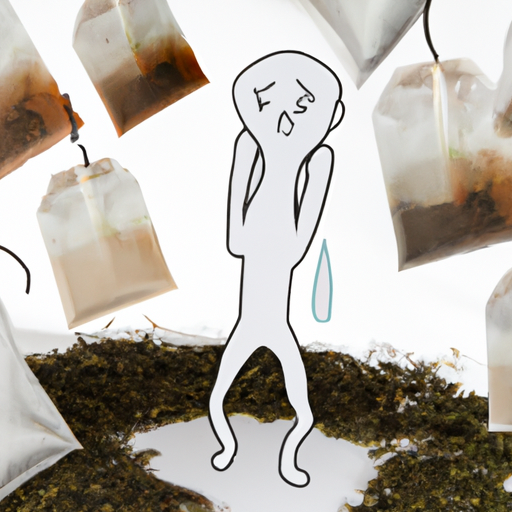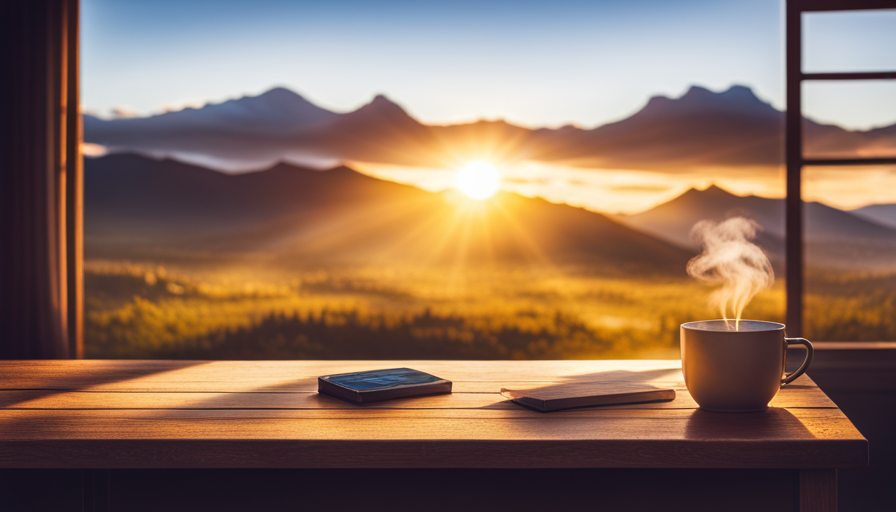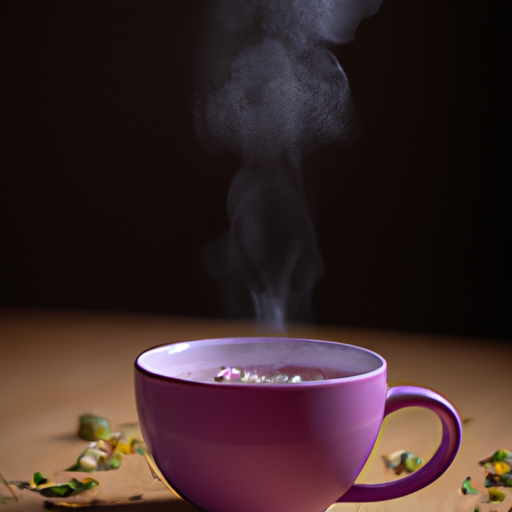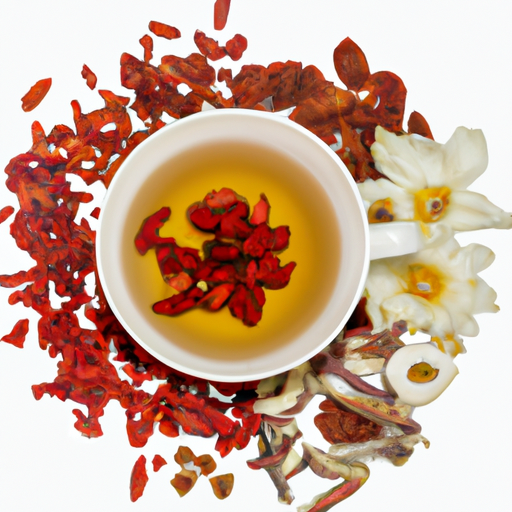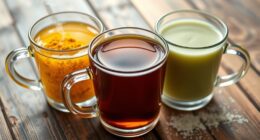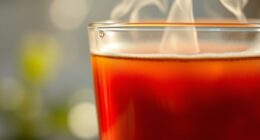Ever heard the saying, “Too much of a good thing can be bad”? This wisdom also holds true for herbal tea. Just like a gentle rain shower can nourish a garden, enjoying a warm cup of herbal tea can be soothing and beneficial for our health. However, just as a heavy downpour can flood and overwhelm a garden, excessive intake of herbal tea can have negative repercussions.
In this article, we will explore the potential consequences of drinking too much herbal tea. From understanding its benefits to discussing the potential side effects and impact on medication and health conditions, we will delve into the intricacies of excessive herbal tea consumption.
Furthermore, we will shed light on the caffeine content of herbal tea and provide tips for enjoying it in a healthy and balanced way. So grab a cup of your favorite herbal infusion, and let’s explore the delicate balance between reaping the benefits and experiencing the downsides of indulging in too much herbal tea.
Key Takeaways
- Excessive consumption of herbal tea can have negative effects on health, including digestive problems, sleep disturbances, and dehydration.
- Some herbal teas can interfere with the effectiveness of medications and worsen certain health conditions.
- Herbal teas may contain caffeine and can have stimulating effects on the central nervous system.
- It is important to consume herbal tea in moderation, follow recommended guidelines, and consult with a healthcare professional for personalized advice.
Understanding Herbal Tea and Its Benefits
If you’re not careful, drinking too much herbal tea can actually have negative effects on your health. It’s important to understand different types of herbal tea and explore their traditional uses to make informed choices.
Herbal tea is made from various plants, including chamomile, peppermint, and ginger, and each type has its own unique properties and potential benefits. For example, chamomile tea is known for its calming effects, while peppermint tea can soothe digestive issues.
However, excessive consumption of herbal tea can lead to potential side effects. In the next section, we’ll discuss the potential side effects of excessive herbal tea consumption.
It’s crucial to strike a balance and enjoy herbal tea in moderation to reap its benefits without experiencing any adverse effects.
Potential Side Effects of Excessive Herbal Tea Consumption
When it comes to excessive consumption of herbal tea, there are a few potential side effects to be aware of.
One of the most common issues is digestive problems, such as stomach cramps, bloating, and diarrhea.
Another possible side effect is sleep disturbances, as some herbal teas can have a stimulating effect that may interfere with your ability to fall asleep or stay asleep.
Lastly, it’s important to note that herbal tea can have a diuretic effect, leading to increased urine production and potential dehydration if not properly balanced with adequate fluid intake.
Digestive Issues
Indulging in an abundance of herbal tea can lead to your stomach revolting, transforming into a tempestuous sea of discomfort and bloating. While herbal tea is generally considered safe and beneficial for digestion, excessive consumption can cause digestive discomfort and bloating. This is mainly due to the presence of certain compounds in herbal teas that can irritate the digestive system.
For example, some herbal teas contain tannins, which can interfere with the absorption of nutrients and lead to bloating. Additionally, some herbal teas have a laxative effect, which can result in digestive issues if consumed in large quantities. It is important to note that individual tolerance to herbal teas may vary, and moderation is key.
Excessive herbal tea consumption can also have other side effects, such as sleep disturbances, which we will explore in the next section.
Sleep Disturbances
Excessive consumption of herbal tea can also disrupt sleep patterns, causing disturbances in the quality and duration of sleep. While herbal tea is often considered a natural remedy for sleep issues, it’s important to consume it in moderation. The caffeine content in some herbal teas, such as chamomile and peppermint, can interfere with sleep quality by stimulating the central nervous system.
Additionally, some herbal teas have diuretic properties, increasing the frequency of nighttime bathroom trips and further disrupting sleep. To ensure a good night’s sleep, it’s advisable to limit herbal tea consumption in the evening and establish a relaxing bedtime routine. This may include avoiding caffeine-containing teas close to bedtime, practicing relaxation techniques, and creating a calming atmosphere in the bedroom.
Transitioning into the next section, excessive herbal tea consumption can also lead to dehydration.
Dehydration
Furthermore, not staying properly hydrated can have detrimental effects on the body, including impacting overall health and well-being. Dehydration, which can occur from drinking too much herbal tea, can lead to a range of health risks. When the body doesn’t have enough water, it can’t function properly. In fact, even mild dehydration can cause fatigue, dizziness, and headaches. Severe dehydration can be life-threatening and may require immediate medical attention. To help you understand the importance of hydration, here is a table highlighting the signs and symptoms of dehydration:
| Signs of Dehydration | Symptoms of Dehydration |
|---|---|
| Thirst | Dry mouth |
| Dark urine | Fatigue |
| Dry skin | Dizziness |
Not only can dehydration impact your overall health, but it can also affect the effectiveness of medications and worsen certain health conditions. Therefore, it is crucial to stay hydrated and monitor your fluid intake, especially if you consume a lot of herbal tea. Transitioning into the next section, let’s explore the potential impact of excessive herbal tea consumption on medications and health conditions.
Impact on Medications and Health Conditions
If you drink too much herbal tea, it can potentially affect the effectiveness of your medications and impact your overall health conditions. Herbal teas, although natural, can have interactions with medications that can be detrimental to your health.
Some herbs used in herbal teas can have an impact on the liver, which is responsible for metabolizing medications in the body. For example, herbs like St. John’s wort can increase the liver’s ability to break down certain medications, leading to reduced effectiveness.
Additionally, some herbal teas can have a blood-thinning effect, which can be dangerous if you’re taking blood-thinning medications.
It’s important to consult with your healthcare provider before consuming large amounts of herbal tea, especially if you’re on medications.
Transitioning to the next section, it’s also worth noting that herbal teas may contain caffeine, which can have its own effects on the body.
Caffeine Content in Herbal Tea
Consuming herbal tea can ignite a surge of energy as it may contain caffeine. While herbal teas are generally caffeine-free, some varieties like yerba mate, guayusa, and some types of green and black tea blends do contain caffeine. The caffeine content in herbal tea varies depending on the type and brewing method. Here are some key points to consider:
-
Caffeine effects: Caffeine in herbal tea can have stimulating effects on the central nervous system, potentially improving alertness and focus.
-
Herbal tea alternatives: If you’re sensitive to caffeine or looking for caffeine-free options, there are plenty of herbal teas available that don’t contain caffeine. Chamomile, peppermint, and rooibos are popular choices.
-
Moderation and recommended intake: It’s important to consume herbal tea in moderation and be aware of any potential interactions with medications or health conditions. It’s always recommended to consult with a healthcare professional for personalized advice.
Moving on to moderation and recommended intake, it’s important to be mindful of the amount of herbal tea consumed to maintain a healthy balance.
Moderation and Recommended Intake
To maintain a healthy balance, it’s important for you to be mindful of how much herbal tea you drink, as excessive intake can lead to unwanted side effects such as increased heart rate and insomnia.
While herbal teas are generally considered safe, it’s still crucial to consume them in moderation. The recommended dosage varies depending on the type of herbal tea, but generally, it is advised to limit your intake to 2-3 cups per day.
By following these guidelines, you can enjoy the numerous health benefits that herbal tea has to offer. From boosting your immune system to aiding digestion, herbal tea can be a valuable addition to your daily routine.
So, let’s explore some tips for enjoying herbal tea in a healthy way, ensuring that you reap all its benefits without going overboard.
Tips for Enjoying Herbal Tea in a Healthy Way
When it comes to enjoying herbal tea in a healthy way, there are three key points to consider.
First, it’s important to choose high-quality herbal tea to ensure you’re getting the full benefits and flavors.
Second, proper preparation and brewing techniques can enhance the taste and maximize the release of beneficial compounds.
Lastly, it’s essential to balance your herbal tea consumption with other beverages to maintain a well-rounded and varied diet.
Choosing High-Quality Herbal Tea
Sipping on a cup of carefully selected herbal tea transports you to a world of aromatic blends and vibrant flavors. When choosing high-quality herbal tea, it’s important to look for reputable brands that prioritize quality and source their ingredients responsibly. These brands often conduct rigorous testing to ensure their teas are free of contaminants and meet high standards of purity. Additionally, high-quality herbal teas are known for their numerous health benefits. They are rich in antioxidants, which help to protect the body against free radicals and reduce the risk of chronic diseases. Some herbal teas, such as chamomile and peppermint, have calming properties that can promote relaxation and improve sleep quality. Transitioning into the next section on proper preparation and brewing, it’s important to know how to make the most of these high-quality teas.
Proper Preparation and Brewing
When it comes to choosing high-quality herbal tea, it’s important to consider factors such as the origin of the tea leaves, the processing methods used, and the reputation of the brand. However, once you’ve found the perfect herbal tea, proper preparation and brewing techniques are vital to fully enjoy its health benefits.
The way you brew your herbal tea can affect its taste, aroma, and even the concentration of its beneficial compounds. So, taking the time to learn the right brewing temperature, steeping time, and water-to-tea ratio can make a significant difference in the quality of your cup.
By following these techniques, you can ensure that you’re maximizing the potential health benefits of your herbal tea.
Now, let’s explore how to balance herbal tea with other beverages to create a well-rounded hydration routine.
Balancing Herbal Tea with Other Beverages
Imagine your hydration routine as a symphony of flavors, where herbal tea harmoniously intertwines with other beverages to create a perfectly balanced and refreshing experience. While herbal tea offers a plethora of health benefits, it’s important to strike a balance and not rely solely on this beverage for hydration.
Incorporating other beverages, such as water and low-sugar fruit juices, helps ensure that you are meeting your body’s hydration needs. Additionally, relying too heavily on herbal tea can have potential health risks. Some herbal teas contain compounds that may interact with certain medications or have adverse effects on individuals with specific health conditions. It’s always a good idea to consult with a healthcare professional before incorporating large amounts of herbal tea into your daily routine.
By balancing herbal tea with other beverages, you can enjoy the flavors and benefits of herbal tea while minimizing any potential health risks. Moving forward to the conclusion and final thoughts, it’s important to understand the overall impact of herbal tea on our well-being.
Conclusion and Final Thoughts
Ultimately, excessive consumption of herbal tea can have detrimental effects on one’s health. It is important to be mindful of the potential long-term effects that can arise from drinking too much herbal tea. While herbal tea is generally considered a healthy beverage, consuming excessive amounts can lead to health problems such as liver damage, kidney stones, and even nutrient deficiencies.
It is crucial to find a balance and not rely solely on herbal tea for hydration. For individuals with specific health conditions, it is advisable to explore alternative beverages that are more suitable. For example, those with acid reflux may benefit from drinking chamomile tea instead of peppermint tea, which can exacerbate symptoms. Additionally, individuals with high blood pressure may want to consider herbal tea options that are low in caffeine, such as hibiscus tea.
It is always best to consult with a healthcare professional to determine the most appropriate herbal tea alternatives based on individual health needs.
Frequently Asked Questions
Can herbal tea be a substitute for regular tea or coffee?
Yes, herbal tea can be a substitute for regular tea or coffee. It offers various health benefits and comes in different flavors. Chamomile tea promotes relaxation, while peppermint tea aids digestion. However, moderation is key as excessive consumption may have potential side effects.
Are there any specific herbal teas that should be avoided altogether?
There are specific herbal teas that should be avoided due to potential side effects and interactions with medications. It is important to consult with a healthcare professional for personalized advice.
Is it safe for pregnant women to consume herbal tea in moderate amounts?
Moderate consumption of herbal tea during pregnancy is generally considered safe. However, some herbs may have adverse effects on fetal development. Additionally, herbal teas can help manage pregnancy symptoms, but it’s important to consult with a healthcare provider for personalized advice.
Can excessive consumption of herbal tea lead to dehydration?
Excessive herbal tea consumption can increase dehydration risks due to its diuretic properties. However, when consumed in moderation, herbal tea offers numerous health benefits, making it a refreshing and hydrating choice.
Are there any age restrictions or limitations on consuming herbal tea?
There are no age restrictions on consuming herbal tea, and it can provide various health benefits. However, moderation is important as excessive consumption may have potential side effects.
Conclusion
In conclusion, it’s important to enjoy herbal tea in moderation to reap its benefits without experiencing any negative effects. Like a gentle breeze that refreshes us, herbal tea can provide us with a sense of calm and relaxation. However, just like a strong gust of wind can knock us off balance, excessive consumption of herbal tea can lead to digestive issues and interact with medications. By following recommended intake guidelines and listening to our bodies, we can savor the goodness of herbal tea without going overboard. Remember, moderation is the key to a harmonious tea-drinking experience.

